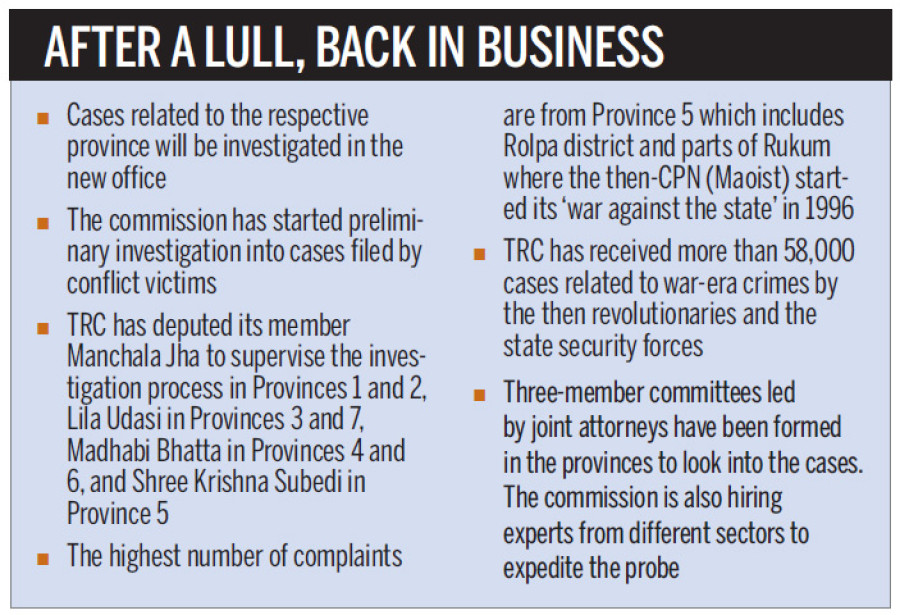National
TRC opens offices in seven provinces, members to lead
The Truth and Reconciliation Commission has set up offices in all the provinces to streamline investigation into insurgency-era complaints. TRC members have been assigned to supervise the provincial offices.
Binod Ghimire
The Truth and Reconciliation Commission has set up offices in all the provinces to streamline investigation into insurgency-era complaints. TRC members have been assigned to supervise the provincial offices.
Cases related to the respective province will be investigated in the new office. The commission has already started preliminary investigation into cases filed by conflict victims. It has deputed its member Manchala Jha to supervise the investigation process in Provinces 1 and 2, Lila Udasi in Provinces 3 and 7, Madhabi Bhatta in Provinces 4 and 6, and Shree Krishna Subedi in Province 5.
The highest number of complaints are from Province 5 which includes districts such as Rolpa and parts of Rukum where the then-CPN (Maoist) started its “war against the state” in 1996.
The highest number of war-era casualties and cases of human rights violation were reported from the districts in the province.
The TRC has received more than 58,000 cases related to war-era crimes by the then revolutionaries and the state security forces. “We are also planning to set up two more branch offices—one either in Kavrepalanchok or Sindhupalchok and the next in Makwanpur or Chitwan,” Udasi told the Post.
He added that three-member committees led by joint attorneys have been formed in the provinces to look into the cases. Udasi said the commission is also hiring experts from different sectors to expedite the probe.
The transitional justice mechanism was formed in February 2015 with a two-year mandate to study war-era crimes.
However, it could barely register cases by the end of its first two-year tenure. TRC officials blame a lack of funds and absence of laws and human resource for the sluggish progress in investigation. They also hold the government’s “indifference” responsible for justice delivery to the listed victims.
The government on February 9 extended its term by one year.
“We don’t think the investigation process will be completed in the remaining eight months,” said a TRC member requesting anonymity.
Forming transitional justice mechanisms and providing justice and reparations to conflict victims was high on agenda when the Maoist revolutionaries joined mainstream politics in 2006.
However, it took over eight years for the government to form the Commission of Investigation on Enforced Disappeared Persons to investigate the present status of the disappeared and the TRC to probe the war-era cases of murder, rape and torture.
The TRC has decided to call for complaints once again following reports that some victims were yet to file their cases. A month’s time from mid-July would be given in a “last” opportunity to file remaining cases.




 9.83°C Kathmandu
9.83°C Kathmandu














